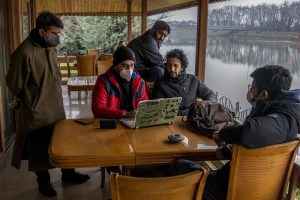The Jammu and Kashmir (J&K) government has gone to great lengths to keep noted Kashmiri journalist Fahad Shah in jail. On March 14, the J&K Police booked Shah under the stringent Public Safety Act (PSA), which allows the government to jail an accused person without a trial for up to two years.
Shah (33) is the founder-editor of the online news magazine, The Kashmir Walla. His reportage of events in Kashmir has been rattling authorities.
His reporting on an encounter between security forces and militants at Nawakadal in the J&K capital, Srinagar, on May 19, 2020 prompted police to summon him for questioning the following day.
On February 4 this year, Shah was arrested by the Pulwama police for his reporting on a police raid in late January, which resulted in the death of four people. While police maintained that the victims were militants, an interview published on The Kashmir Walla website revealed that they were in fact civilians.
After 22 days in police custody, Shah was granted bail by a special court of the National Investigation Agency. He was arrested again, this time by the Shopian police, and let out on bail on March 5. Shah was taken into custody a few hours later by the Srinagar police – the third time that he was arrested in a span of 30 days. This arrest was also related to his magazine’s reportage of the Nawakadal encounter in May 2020.
Kashmir has been a difficult place for journalists to work in since 1990, when the anti-India militancy erupted. Journalists came under pressure from militants and security forces alike.
However, their troubles have multiplied manifold since August 5, 2019, when India’s Hindu nationalist Bharatiya Janata Party (BJP) government revoked Article 370 of the Indian Constitution, which provided J&K with a measure of autonomy. The government’s move was deeply unpopular in the Kashmir Valley. Anticipating protests, the BJP government clamped down on the public in general and local journalists in particular.
The targeted harassment and assault of Kashmiri journalists has intensified in the years since. Journalists in Kashmir have been slapped with charges under the Unlawful Activity Prevention Act (UAPA), an anti-terror law, and complaints have been registered against them at police stations. They have been warned for reporting stories that debunked the government’s narrative of normalcy. Photojournalists have been assaulted by the security forces. With an array of laws, policies, summons, and notices, the Indian state has managed to coerce journalists into self-censorship.
According to a report by a fact-finding committee of the Press Council of India, since August 2019, eviction of journalists from government-allotted residential accommodation has been used to pressure journalists “who the administration felt did not see eye to eye with the government.”
Authorities have not hesitated to arrest journalists and others under draconian laws like the PSA. According to a report by the J&K Coalition of Civil Society and the Association of Parents of Disappeared Persons, 662 people, including a former chief minister and a parliamentarian, were booked under the PSA in 2019.
How the state intimidates journalists is evident from the way the police have hounded Shah on trumped up charges. Police arrested him for social media content that they felt had allegedly “caused (a) dent to the image of law enforcing agencies besides causing ill will and disaffection against the country.” They have also said that he is “wanted in three cases for glorifying terrorism, spreading fake news and inciting general public for creating law and order situations.”
The complaints under which he has been booked “are completely baseless,” Shah’s lawyer Umair Ronga told The Diplomat, pointing out that the immediate granting of bail by the courts in these cases are “a testament to the same.”
“By booking him under the PSA, which also is unwarranted,” the authorities “seem to be challenging the judiciary,” Ronga said.
Slapping Shah with charges under PSA are “only to prolong his custody. This protracted case hearing, the whole motive is to keep him behind the bars,” the lawyer said.
The detention order against Shah says that he had “radical ideology from childhood” and that his website is disseminating “anti-India sentiment,” “ISI propaganda” (referring to Pakistan’s intelligence agency), and “victimhood narrative.”
Under the PSA, district magistrates are merely tasked with approving dossiers that are prepared by the police against the accused to justify a detention. The magistrate then issues an order to detain the accused. It has been grossly misused in J&K and is a grave violation of a citizen’s rights.
In 2021, Reporters without Borders ranked India 142nd out of 180 countries in the World Press Freedom Index. According to the report, India is among the countries that are “bad” for journalism and among the most dangerous locations in the world to practice journalism.

































